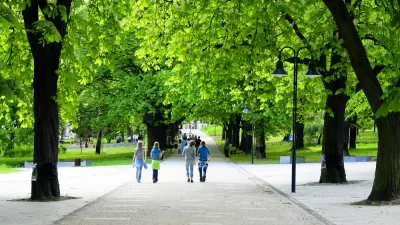On a recent trip to Portland, land use attorney Bill Adams couldn't help but make comparisons to redevelopment efforts elsewhere. He found 7 tangible areas in which Portland shines through its copious clouds.

Upon visiting Portland, land use attorney Bill Adams, came away with the impression that his own city, as well as other western cities, missed the memo on how to redevelop well. In particular, Portland's redevelopment efforts either produced or preserved the following livable urban characteristics:
"1) Portland puts street level before skyline. Portland’s skyline is unimpressive. . . In contrast, at street level, Portland seems more an urban environment than its bigger West Coast brethren.
2) Tolerance. . . While signs in other cities speak of banning . . . activities in various locations, Portland appears more ready to embrace, or at least tolerate, all segments of its population.
3) Preservation and adaptive reuse. . . the city appears to have not simply preserved 'landmark' buildings, but preserved neighborhood and urban fabric as well.
4) Priority rather than equality for non-auto transportation projects.
5) Grid relief. . . Portland has embraced its few existing alleys (and by appearance, created some new ones) by making them small linear parks, retail arcades, or outdoor patios.
6) Parks. Portland was seventh on a recent ranking of best . . . cities for parks. . . if the ranking was limited to downtowns, Portland would fare even better and some of the other cities in the top ten wouldn’t be there.
7) Trees. Portland, thanks to its abundance of rainy days, is very green. This green extends right into its downtown. Not just little plants and trees but big shade trees. These trees soften downtown’s hardscape and create a park-like feeling in most of downtown."
FULL STORY: 7 ways Portland is better than other cities – an outsider’s perspective.

Maui's Vacation Rental Debate Turns Ugly
Verbal attacks, misinformation campaigns and fistfights plague a high-stakes debate to convert thousands of vacation rentals into long-term housing.

Planetizen Federal Action Tracker
A weekly monitor of how Trump’s orders and actions are impacting planners and planning in America.

San Francisco Suspends Traffic Calming Amidst Record Deaths
Citing “a challenging fiscal landscape,” the city will cease the program on the heels of 42 traffic deaths, including 24 pedestrians.

Defunct Pittsburgh Power Plant to Become Residential Tower
A decommissioned steam heat plant will be redeveloped into almost 100 affordable housing units.

Trump Prompts Restructuring of Transportation Research Board in “Unprecedented Overreach”
The TRB has eliminated more than half of its committees including those focused on climate, equity, and cities.

Amtrak Rolls Out New Orleans to Alabama “Mardi Gras” Train
The new service will operate morning and evening departures between Mobile and New Orleans.
Urban Design for Planners 1: Software Tools
This six-course series explores essential urban design concepts using open source software and equips planners with the tools they need to participate fully in the urban design process.
Planning for Universal Design
Learn the tools for implementing Universal Design in planning regulations.
Heyer Gruel & Associates PA
JM Goldson LLC
Custer County Colorado
City of Camden Redevelopment Agency
City of Astoria
Transportation Research & Education Center (TREC) at Portland State University
Jefferson Parish Government
Camden Redevelopment Agency
City of Claremont



























